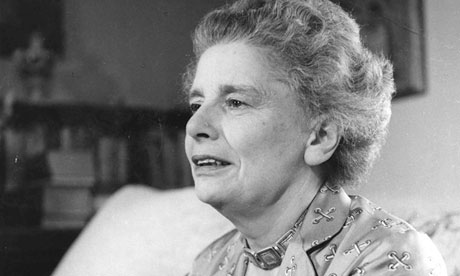
"Just how difficult it is to write a biography," observed Rebecca West in Vogue in 1952, "can be reckoned by anybody who sets down just how many people know the truth of his or her love affairs." In West's case, this instinctive association of biography with romantic secrets is apt.
Next to Black Lamb and Grey Falcon, her brilliant account of a journey through Yugoslavia in 1937, and perhaps The Meaning of Treason, her study of the Nuremberg trials, West is now remembered chiefly for her long affair with HG Wells, her many lovers and a noble life, spanning much of the 20th century, that struggled to reconcile being a passionate and ambitious woman in a harsh male world.
West was born a Victorian, Cicely Isabel Fairfield in 1892, but came of age in Edwardian London as a suffragette, a Fabian socialist and a fiery freelance who took her nom de plume from an Ibsen play. She said she "wanted to be taken seriously as a writer", but her pseudonym was both provocative and prophetic. In Rosmersholm, "Rebecca West" is the mistress of a married man.
Fairfield/West had a lot to escape from, and plenty to hide. Young Cissie was enthralled by her sexually wayward father, a gambler, disgraced soldier, sometime journalist and down-at-heel seducer. His daughter idolised him as a "shabby Prospero". Actually, he disappeared to Australia, leaving a family of not-so-genteel women to fend for themselves. Here, however, Cissie lucked out.
Edwardian England is often described as an imperial swan song of big dinners and hot summers brought to an abrupt close by the great war. But it was also a decisive decade in which a new generation of emancipated young men and women separated themselves from their Victorian parents through the twin rebellions of work and sex.
Dedicated to both these drives, Rebecca West was completely at home in a confident new society. She launched a career as a journalist, writing in the Freewoman and the Clarion, suffragette publications, and began a lifelong quest for a "boof", a beautiful boy. By 1916, she had pulled off a remarkable double: the succès fou of her Henry James biography and her rollercoaster affair (plus an illegitimate son) with HG Wells, a literary giant of the age.
West was always a divided and divisive figure, cheerfully embodying many contradictions. Virginia Woolf described her as "a cross between a charwoman and a Gypsy", with dirty fingernails. Others saw her as "a hardened old reprobate", but also a siren whose voice was "compounded of milk and honey". Being both a class outsider as well as a sexual predator seems to have drawn her to Wells, who fell in love with her "dark, expressive troubled eyes" and "big, soft mouth".
The rest of her career was conducted in the shadow, and according to the conventions, of her Edwardian beginnings. The relationship with Wells cooled. The rage of their son consumed and tormented her without mercy. Anthony West's versions of his mother's character pursued her to the grave (she died in 1983) and beyond.
Who was Rebecca West? A feminist pioneer who also believed in marriage? A brilliant journalist who wrote a 20th-century classic? A jill of all trades whose life and loves mirror their century? Despite her publisher's claim of a "definitive biography", Lorna Gibb fails to illuminate these questions.
West's World is really what Auden called "a shilling life", the retelling of a career we love to read about, lazily written and sloppily edited. Anthony West did not write HG Wells in Love. The editor of the TLS in 1970 was Arthur Crook, not Cook.
For a fuller understanding of this fascinating woman, we're better off returning to another biography, published as recently as 1987, by Victoria Glendinning. Strangely, Lorna Gibb hardly refers to this. I wonder why.

